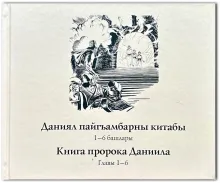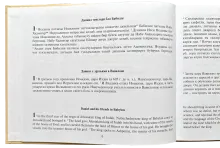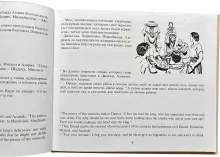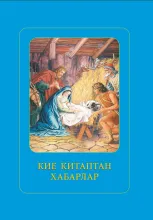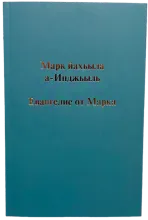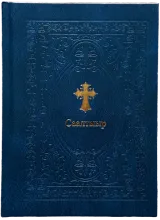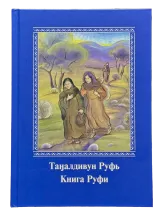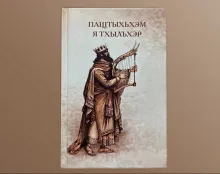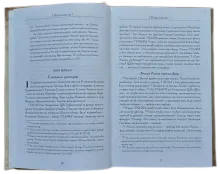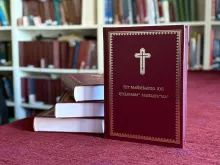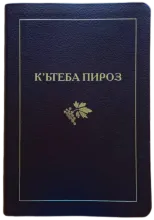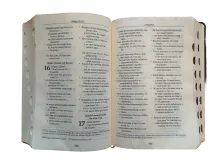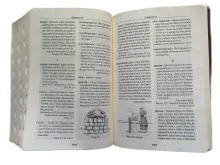selections-daniel-karachay-language
The Institute for Bible Translation (IBT) has released a new publication — the book of Daniel (chapters 1–6) in the Karachay language. The Karachay text is given with a parallel Russian and English translation on each page. This is the second Old Testament portion published as part of IBT's Bible translation project into Karachay, following the 2022 edition of the book of Jonah.
childrens-bible-published-in-the-nogai-language
The Institute for Bible Translation has released a new publication in the Nogai language – the illustrated Children's Bible. Previously published works in this language include: Ruth/Esther/Jonah (2005), the New Testament (2011), Genesis (2016), Gospel Parables (2016), Proverbs (2017), and the Pentateuch (2023).
The new edition contains 250 Bible stories covering events from the Old and New Testament — from the Creation of the world to the Apocalypse. The book is intended for readers of all ages who wish to familiarize themselves with the Bible...
marks-gospel-published-in-the-abaza-language
The Institute for Bible Translation has published the Gospel of Mark in the Abaza language with a parallel Russian translation. This edition completes the Synoptic Gospels in Abaza. Previously published were Matthew (2021) and Luke/Acts (2023).
The edition opens with an introductory article in the Abaza language dealing with the composition of the biblical corpus of texts and the abbreviated names of the books. The text of the Gospel is structured into thematic blocks, accompanied by cross-references and footnotes...
reprint-of-psalms-in-the-yakut-language
In response to numerous requests from believers in Yakutia, IBT has published a reprint of the book of Psalms in the Yakut/Sakha language. The previous edition of the Psalter in Yakut was in 2009. Over the years, the translation has undergone serious testing by time and liturgical practice, receiving high praise from both clergy and lay people.
Local clergy affirm that the Yakut Psalter has become essential to daily church life. It is used in services, memorials, consecrations, and evangelism, bringing the meaning of the Psalms closer and making them more understandable for parishioners.
the-book-of-ruth-in-the-even-language
The Institute for Bible Translation has released an illustrated edition of the book of Ruth in the Even language of eastern Siberia. The publication was carried out with the blessing of Archbishop Roman of Yakutsk and Lensk.
The new edition is bilingual: the Even translation, produced by translator M.N. Taishina and editor R.P. Kuzmina, is accompanied by a parallel Russian text. The book is decorated with traditional Even ornaments and distinctive illustrations by artist M.P. Adamova...
presentation-of-the-nenets-four-gospels-and-acts
The official presentation of the Four Gospels and Acts in the Nenets language took place in Salekhard on October 15, 2025. The event was organized by the Salekhard Diocese of the Russian Orthodox Church and was held in the conference hall of the Shemanovsky Museum and Exhibition Complex, dedicated to the history of the Orthodox mission on the Yamal Peninsula.
bible-stories-in-siberian-tatar
The Institute for Bible Translation (IBT) continues its publication of translations into the Siberian Tatar language. Following the Gospel of Mark, published earlier in 2025, "Bible Stories" has now been released in Siberian Tatar. Bible Stories is a collection of narrative passages recounting the main events described in the Old and New Testament, from the creation of the world to the book of Revelation. The book is a concise version of the well-known Children's Bible, which IBT has published for many years and continues to publish in various languages...
1-2-samuel-and-1-2-kings-in-kabardian
The Institute for Bible Translation (IBT) has released a new publication – the books of 1,2 Samuel and 1,2 Kings in the Kabardian language of the North Caucasus.
These four books (also known as 1-4 Kingdoms in the Greek and Russian tradition) belong to the historical section of the Old Testament. They narrate the stories of famous kings and prophets of the people of Israel: Saul, David, Solomon, Elijah, and many others. These texts describe the establishment of the monarchy, its first achievements and failures, the glorious deeds of David and the wise reign of Solomon, and the subsequent history of the divided Northern and Southern Kingdoms with their complex neighborly relations...
four-gospels-and-acts-in-nenets
IBT has published an important new book in the Nenets language: the Four Gospels together with the Acts of the Apostles.
The edition opens with a welcoming address by Orthodox Archbishop Nicholas of Salekhard and Novy Urengoy. He emphasizes that reading the New Testament is indispensable spiritual nourishment for believers and contributes to a person's moral transformation. He also notes that this translation is not merely a linguistic project, but the fruit of immense labor requiring deep theological and language knowledge, as well as love for the Word of God and for the Nenets people.

